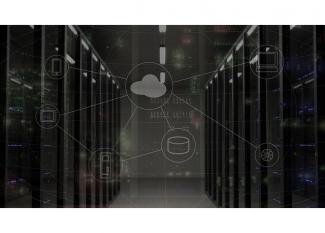Researchers from the U.S. Department of Energy’s (DOE) National Energy Technology Laboratory (NETL) are working with data science leadership and experts from DOE’s Office of the Chief Information Officer (OCIO) to develop powerful new cloud computing capabilities that are harnessing the power of big data to advance energy research and data computing across the Department.
One facet of the collaboration involves at-scale testing of NETL’s SmartSearch, a custom deep-learning data mining and explorational tool that is using the cloud computing capabilities of OCIO’s Innovation Community Center (ICC) to accelerate testing and scalable deployment. The ICC is a digital hub and innovation platform for accelerating mission outcomes through collaborative exchange, market research and sandboxes for rapid prototyping, proof of concepts and production pilots. In FY21, ICC will be continuously maturing operations.
“The ICC knowledge and expertise shared with our researchers has allowed us to quickly and efficiently mature this cutting-edge cloud-based solution, saving significant time and taxpayer money,” NETL Director Brian J. Anderson, Ph.D., said. “In turn, the Lab is helping the ICC by testing process and platforms to support OCIO’s broader goals.”
SmartSearch is capable of crawling the entire World Wide Web to find relevant data to a specific user’s needs and returns results in a user-friendly format using advanced artificial intelligence (AI) and machine learning (ML) techniques. It has been used through the ICC platform to help accelerate AI/ML research for materials science, subsurface science and geospatial research at NETL, and currently the team is adapting the tool for cloud scalable integration with the ICC platform. With the proof of concept of this tool completed, it is being adapted for broader DOE use in 2021, allowing researchers to save countless hours of manual data search, review, acquisition and transformation.
Another significant outcome of the NETL-OCIO collaboration has been elevating NETL’s data curation and collaboration platform, the Energy Data eXchange (EDX), to become the first preferred DOE-wide platform for curation, access and management of geospatial data resources for the Department.
“EDX is a great fit for the ICC,” said Kelly Rose, Ph.D., a data scientist at NETL and one of the creators of EDX. “Data are both the foundation and result of research, and this EDX-ICC collaboration is improving reliable preservation of DOE-data products and providing enduring access to these products.”
EDX has been vetted by various elements at DOE, including the Chief Counsel, the Artificial Intelligence and Technology Office, the Office of Technology Transitions, the Office of Energy Efficiency and Renewable Energy, the Office of Environmental Management, the Office of Legacy Management, and OCIO. They reviewed EDX’s, cybersecurity, IT analysis, operations and privacy missions as they relate to geospatial information, data, innovation, and management. EDX has been in development for almost a decade and has garnered utilization and the trust of DOE’s national laboratories, as well as many industry, academic and other research partners both domestic and international.
“Currently, DOE geospatial data is largely disparate, and if it is maintained, it is done so at local levels,” said Pamela K. Isom, Deputy Chief Information Officer, Architecture, Engineering, Technology and Innovation at DOE and creator of the ICC. “By elevating EDX, the ICC is seeking to offer a well-developed platform, compliant with DOE requirements, for any DOE entity to use for either primary curation of their geospatial data products, or to connect their own platforms to EDX. As a result, the DOE geospatial community will be provided with improved access, while adhering to security and information technology rules and requirements.”
The NETL-OCIO collaboration has also helped to ensure compliance with federal and DOE goals designed to accelerate trustworthy AI science and federal research. Given the widespread use of AI throughout DOE research and beyond, DOE’s Enterprise Architecture Governance Board recognized the need for better AI risk mitigation.
“ICC-led efforts answered this call and a playbook was created to remediate and address this challenge,” Isom said. “NETL researchers, alongside other departmental entities including the general council, were instrumental in reviewing and providing feedback in support of this playbook and the initial release this quarter.”
All DOE entities can leverage this valuable playbook to establish AI checklists and assessments, or to troubleshoot AI programs and performance-related risks while ensuring alignment with federal policies, AI trustworthy principles and ethical considerations.
“NETL is proud to be a part of this valuable partnership with OCIO and the wins we’ve had so far,” Anderson said. “We’ve demonstrated that when we work together, we can drive innovations with substantial impacts for the Department. Furthermore, with tools like SmartSearch and platforms like EDX and the ICC, the Department enables even greater collaboration among our researchers, which I’m confident will help accelerate technology solutions to our nation’s greatest energy challenges.”
The U.S. Department of Energy’s National Energy Technology Laboratory develops and commercializes advanced technologies that provide clean energy while safeguarding the environment. NETL’s work supports DOE’s mission to ensure America’s security and prosperity by addressing its energy and environmental challenges through transformative science and technology solutions.




